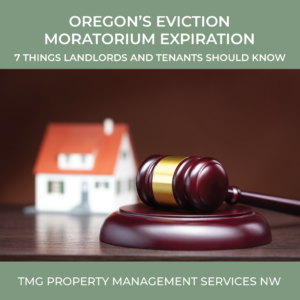NOTE: Information provided in this article is not intended as legal advice. Landlords and tenants should consult a lawyer before taking any legal action.
This article only pertains to the state of Oregon. For Washington legal updates, please visit:
Washington's Eviction Moratorium Extended: 5 Things Landlords and Tenants Should Know
There is good news for landlords with rental properties in Oregon. Oregon's eviction moratorium officially expired on June 30, 2021, with no further extensions. Additionally, on August 26, 2021, the U.S. Supreme Court struck down the Center for Disease Control's (CDC) federal eviction moratorium, declaring it unconstitutional. The CDC no longer has the right to stop evictions at the federal level. Evictions are now based on state-specific regulations and protections.
That doesn't mean that tenants are without protections, however. In the months since the end of Oregon’s statewide eviction moratorium, several new emergency bills have been signed into legislation that protect both tenants and landlords alike, including: Senate Bill 282, Senate Bill 278, Multnomah County Ordinance 1296, and Chief Justice Order 21-031.
There are 7 key factors both landlords and tenants should know:
1) Tenants are required to pay rent on time.
Senate Bill 282 (SB 282), which was signed into law on May 19, 2021, requires tenants to begin paying rent on time from July 2021 onward.

2) Landlords can charge late fees for past-due rent.
Landlords may now apply late fees in Oregon to past-due rent balances that originated in or after July 2021. Late fees may be applied regardless of whether tenants are seeking rental assistance, have a balance from the emergency period, or are waiting on funds from the Landlord Guarantee Program (LGP). It is important to remember, though, that late fees may not be applied to any past-due rent balances that were accrued between April 1, 2020 through June 30, 2021.
3) Tenants can be evicted for non-payment of rent.
As of June 30, 2021, termination of tenancy (eviction) due to non-payment is also possible. Evictions for reasons unrelated to non-payment are also permitted. It is important to remember, though, that evictions are not permitted due to any past-due rent balances that were accrued between April 1, 2020 through June 30, 2021.
4) The eviction grace period protects tenants from late fees, evictions, or other actions to recover past-due balances that accrued between April 1, 2020 and June 30, 2021.
The new eviction grace period to pay back non-payment balances extends through February 28, 2022. All protections regarding non-payment prior to the end of the grace period still apply, regardless of whether the tenant handed in a declaration before July 1, 2021.
This means the following actions are still prohibited:
- Evictions for non-payment of rent that accrued between April 1, 2020 and June 30, 2021.
- Assessing late fees on past-due rent that accrued between April 1, 2020 and June 30, 2021.
- Filing actions to recover past-due rent that accrued between April 1, 2020 and June 30, 2021.
5) Landlords may serve tenants a 10-Day Termination for Non-Payment. Tenants can apply for rental assistance to delay eviction due to non-payment.
If a 10-day termination for non-payment is served to a tenant and, afterwards, the tenant provides the landlord written or electronic documentation (including a copy or photograph of the documentation by email or text message) verifying the submission of an application for rental assistance, the 10-day notice must be rescinded, and the landlord must wait 60 days before reissuing a termination notice. In Multnomah and Washington Counties, the landlord must wait 90 days before reissuing a termination notice.
If a landlord already has documentation on file that a tenant has applied and is waiting for approval or receipt of rental assistance, a landlord may not issue the 10-day termination for non-payment notice until 60 days (or 90 days in Multnomah and Washington Counties) have passed from receipt of documentation.
Landlords can issue a new termination notice once the 60 days (or 90 days in Multnomah and Washington Counties) have passed.
6) Tenants are protected if a landlord doesn't follow established procedures around termination for non-payment.
Senate Bill 278 (SB 278), which was signed into law on June 24, 2021, effective immediately, offers additional protections to tenants providing documentation to their landlord that they have applied for rental assistance (see numbers 4 and 5 above).
If a landlord violates SB 278, a tenant may have a defense to eviction, obtain relief to recover possession, or address any other violation.
Note: A tenant is not entitled to a prevailing party fee, costs, or attorney fees if the landlord delivered all notices required OR did not know or have reasonable cause to know that the tenant had provided documentation eviction was filed.
7) Landlords can apply for support funding while a tenant is applying for rental assistance.
The Landlord Guarantee Program (LGP) was put in place through Senate Bill 278 (SB 278). This fund is for landlords who have tenants that have provided proof that they have applied for rental assistance and delayed an eviction due to non-payment for 60-90 days. The fund only provides rental amounts for this specific time period while the tenant is awaiting approval or funding from a rental assistance program. Landlords may apply on behalf of their tenants to receive funding directly.
Contact Us Today to Receive a FREE Rental Analysis

Michelle Villarma
Multifamily - Oregon & Washington
Single Family - Tri-Cities

Tara Jackson
Single Family - SW Washington and Oregon

Karen Kroner
Single Family - Tri-Cities




